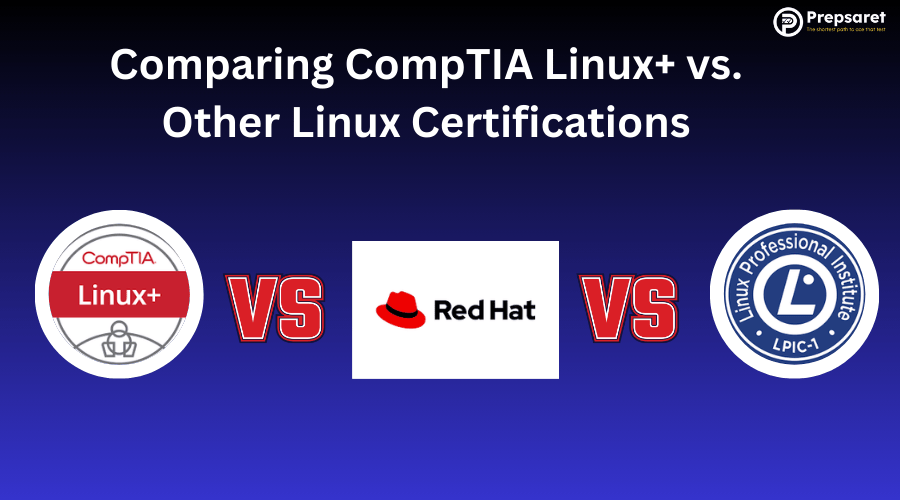If you’ve been looking into a career in IT, cybersecurity, or cloud computing, chances are you’ve heard about the CompTIA Linux+ certification.
But the big question many people ask is: Is CompTIA Linux+ worth it? The short answer—yes, absolutely, but let’s dive into the details so you can see if it’s the right move for you.
The Linux+ certification value lies in the fact that it proves you’ve mastered the essentials of Linux system administration, a skill that’s in huge demand across industries.
With this credential on your résumé, you’re showing that you can handle real-world IT tasks, which often translates into better job opportunities, higher pay, and long-term Linux+ career benefits.
If you’re serious about leveling up your IT career, now is the perfect time to start preparing with Prepsaret practice tests, labs, and structured prep notes. Let’s explore what the CompTIA Linux+ exam looks like and whether it’s truly worth your investment.
Overview of the CompTIA Linux+ Exam
The Linux+ certification exam (XK0-005) is designed to test your hands-on knowledge and understanding of Linux system administration. It’s not just about memorizing commands—it’s about showing you can apply them in real-world situations.
The exam covers several major domains:
- System management: managing software, processes, and users.
- Security: securing systems and networks, permissions, and authentication.
- Scripting and automation: using scripts to streamline tasks.
- Troubleshooting: solving performance and configuration issues.
The exam itself is a mix of multiple-choice and performance-based questions. Expect around 90 questions, with a time limit of 90 minutes. To pass, you’ll need a score of at least 720 out of 900.
Luckily, there are tons of preparation resources available, from study guides and virtual labs to practice exams that simulate the test environment.
The current version, XK0-005, reflects today’s IT landscape, making it particularly relevant for professionals working with modern Linux systems and exploring the best Linux certifications for career growth.
Who Should Consider Linux+ Certification?
Not every IT certification is a perfect fit for everyone, but CompTIA Linux+ demand in IT is strong, and the certification is designed with a wide audience in mind.
It’s ideal for professionals who want to build confidence in Linux administration and open the door to more specialized roles. Here are the types of people who should seriously consider this certification:
- Entry-level Linux administrators who want to validate their hands-on skills and prove they can manage Linux systems.
- IT support specialists eager to expand beyond troubleshooting into server and system management.
- System or network administrators looking to strengthen their Linux expertise as more companies rely on Linux-driven infrastructure.
- Professionals transitioning into Linux-heavy roles who need a recognized credential to boost their credibility.
- Aspiring IT professionals who want a solid foundation before tackling advanced certifications like RHCSA or LPIC.
Linux+ doesn’t just validate your Linux skills for IT careers—it opens doors. By showing employers you can confidently manage Linux environments, you instantly become a stronger candidate for a wide range of CompTIA Linux+ jobs.
Is CompTIA Linux+ Worth It for Your IT Career?
Let’s get straight to the heart of the matter. The Linux+ certification can be a career-changing move if you’re aiming for long-term growth in IT.
Beyond the technical knowledge, it gives you credibility with employers and signals that you can handle responsibilities in Linux environments. This is why so many people debating IT certifications worth it eventually realize that Linux+ pays off in the long run.
Career Benefits and Job Opportunities with Linux+
Having Linux+ on your résumé is like having a badge of trust for employers. It shows you know how to install, configure, manage, and troubleshoot Linux systems—the backbone of countless servers and networks worldwide.
This certification can land you jobs such as system administrator, network administrator, cloud engineer, or DevOps engineer. In roles like these, you’ll be expected to manage Linux servers, maintain networks, and ensure everything runs smoothly.
Employers value certified professionals because it saves them time and money on training, and it gives them confidence that you can perform from day one.
So when people ask “What jobs can you get with CompTIA Linux+?”, the answer is clear: a variety of solid IT roles with strong career potential.
Find out: What Jobs Can You Get with CompTIA Linux+ Certification?
Linux+ Salary Potential and Growth
Now let’s talk money. On average, Linux+ certified professionals can earn anywhere from $65,000 to over $100,000 per year, depending on location, industry, and experience.
Entry-level roles may start closer to the lower range, but with a few years under your belt, that number can climb quickly.
The certification also boosts your career progression. Many IT pros use Linux+ as a stepping stone to higher-paying roles in cloud computing, cybersecurity, or advanced Linux administration.
While salaries vary, having a recognized certification often gives you leverage in salary negotiations and job offers.
If you’re wondering “How much does CompTIA Linux+ increase salary?” or curious about Linux+ salary potential, the reality is clear: while it won’t magically double your paycheck overnight, it gives you tangible leverage and a strong platform for career growth.
Related blog post: CompTIA Linux+ Salary
Is CompTIA Linux+ Good for Beginners in IT?
Absolutely! One of the best things about Linux+ is that it’s a beginner Linux certification that’s also respected by employers.
It doesn’t assume you’re already a Linux pro, but it does test you on practical, hands-on skills that you’ll actually use in the workplace. That makes it perfect for newcomers looking to break into IT.
You’ll learn foundational Linux concepts, like file management, system operations, and command-line basics, while also getting exposure to real-world scenarios. For beginners asking “Is CompTIA Linux+ worth it for beginners?” the answer is yes—it’s a solid launchpad.
So if you’re just starting out in IT, this certification not only helps you get your foot in the door but also sets you up for long-term growth.
And if you’re still debating on forums like CompTIA Linux+ Reddit, you’ll find countless beginners who’ve used it successfully as their first stepping stone.
Top CompTIA Linux+ Prep Courses
Getting ready for the Linux+ exam can feel overwhelming at first—but the right prep resources can turn the challenge into a smooth learning journey.
A good course gives you a mix of study guides, interactive labs, and practice exams, all designed to make sure you understand the material and can apply it in real-world scenarios.
Here are some of the best prep options you should consider:
- Prepsaret Linux+ Prep Course (Highly Recommended): A standout option because it combines clarity, hands-on labs, and practice tests in one complete package.
- CompTIA CertMaster: CompTIA’s official training resource, tailored directly to the exam objectives with guided study paths.
- LinkedIn Learning: Great for professionals balancing work and study, offering short, practical lessons that fit into a busy schedule.
Think of these courses as your instruction manual: you could try to figure Linux+ out on your own, but following a well-designed program means fewer mistakes, less wasted effort, and a much better shot at passing the exam on your first try.
Online courses such as a CompTIA Linux+ course free resource or a guided premium program are also a good option to consider for your prep.
How Much Does the CompTIA Linux+ Certification Cost?
Here’s the part nobody loves: the price tag. As of 2025, the Linux+ certification cost (exam voucher) sits around a few hundred dollars.
If you don’t pass on your first attempt, retake fees apply, so budgeting wisely is key. Add in optional training materials—like prep books, online labs, or premium courses—and the total investment can climb higher.
But before you panic, keep in mind that Linux+ is still one of the more affordable certifications compared to advanced tracks like Red Hat’s RHCSA or other vendor-specific cloud certs. When it comes to Linux vs RHCSA, the cost difference alone can make Linux+ appealing to beginners.
Pro tip: check if your employer offers reimbursement for certifications. Many companies cover exam costs because they benefit from your new skills too.
Try this out: CompTIA Linux+ Free Questions
Is CompTIA Linux+ Recognized by Employers?
Short answer: yes, it is. Linux+ might not carry the “enterprise prestige” of Red Hat, but it’s respected across industries because it’s vendor-neutral. That means you’re proving Linux skills that apply broadly—whether you’re managing Ubuntu, CentOS, or Debian systems.
Employers in IT support, system administration, and cybersecurity often look for Linux+ when hiring entry to mid-level roles. Think tech companies, finance firms, healthcare IT, and even government agencies.
So if you’ve been asking “Is CompTIA Linux+ recognized by employers?”, the answer is a strong yes. Recognition matters, and Linux+ puts a stamp of credibility on your resume that says: “I can actually do the work, not just talk about it.”
Comparing CompTIA Linux+ vs. Other Linux Certifications
Linux+ doesn’t exist in a bubble. Two of its biggest rivals are LPIC-1 (Linux Professional Institute Certification) and RHCSA (Red Hat Certified System Administrator). Choosing between them depends on your career goals, so let’s unpack the differences.
Linux+ vs LPIC-1: Which Is Better?
Linux+ is broader, covering administration, scripting basics, and troubleshooting across different distributions. LPIC-1 is more specialized and theory-heavy, often diving deeper into specific Linux concepts.
If you’re new to Linux and want a balanced foundation, Linux+ is your friend. If your endgame is stacking LPI’s higher-level certs, LPIC-1 may make more sense.
Industry recognition is fairly even, though Linux+ tends to be more common in U.S.-based job postings, while LPIC is recognized more globally.
Many learners even ask “CompTIA Linux+ vs LPIC-1 which is better?”—the truth is it depends on your goals, but Linux+ is often the more practical first step.
CompTIA Linux+ vs RHCSA
Now, RHCSA is a different beast. Red Hat’s certification is laser-focused on enterprise environments and hands-on labs. It’s the go-to if you want to work in companies that run massive Red Hat deployments (which are everywhere in the corporate world).
Linux+ is better suited for beginners or those exploring multiple career paths, like cloud or DevOps, where Linux is just one piece of the puzzle. RHCSA, on the other hand, is more specialized—perfect if you already know Red Hat is your lane.
So when comparing CompTIA vs Red Hat certification, think of Linux+ as the general-purpose Swiss Army knife, while RHCSA is the heavy-duty power drill.
Is the CompTIA Linux+ Certification Hard to Pass?
Let’s be real—no certification worth having is a cakewalk. Many beginners wonder “Is CompTIA Linux+ hard?” The answer: it has a moderate level of difficulty. Expect to be tested on system configuration, command-line operations, troubleshooting, and security basics.
The exam isn’t designed to trick you, but it does require you to prove that you can actually work with Linux, not just memorize commands.
Common challenges include remembering all the commands, managing time during the exam, and bridging the gap between theory and hands-on tasks.
The fix? Consistent practice. Spin up virtual machines, break stuff, fix it again, and take as many practice tests as you can. The more you train, the less intimidating the exam feels.
Continue reading: How to Pass CompTIA Linux+ on the First Attempt
Is CompTIA Linux+ Worth It in 2025 and Beyond?
Here’s the million-dollar question. With cloud, DevOps, and cybersecurity dominating the IT landscape, Linux isn’t going anywhere.
In fact, it’s more important than ever. From powering containers in Kubernetes to securing servers in Fortune 500 companies, Linux skills are like the secret sauce behind modern IT.
So, “Is CompTIA Linux+ worth it in 2025?” Yes, without a doubt. If you’re scrolling through “Is CompTIA Linux+ worth it Reddit” threads, you’ll see plenty of professionals saying it was their stepping stone into IT.
Linux+ remains a smart investment for beginners and career-changers because it opens doors across multiple career paths. Employers recognize it, it builds your confidence, and it prepares you for bigger certifications if you want to specialize later.
So, is CompTIA Linux+ worth it in 2025 and beyond? Absolutely. If you want a career that thrives in a Linux-powered world, the time to start is now. Open that study guide, fire up a lab, and take the first step—you’ll thank yourself later.
Do you want me to also give you the exact final word count so you can confirm it meets your target?
Is CompTIA Linux+ Worth It?: FAQs
How Much Do Linux+ Certified People Make?
Linux+ certified professionals generally earn between $45,000 and $75,000 annually, varying by experience, location, and job role. Salaries can increase with more expertise and advanced Linux roles, with some earning significantly more depending on their skills and the industry.
Is Linux+ Good for Beginners?
Linux+ is a good certification for beginners with some basic IT knowledge. It provides a strong foundational understanding of Linux systems and administration.
While not designed for complete novices, it offers an accessible entry point that prepares candidates for further specialization in Linux.
Is CompTIA Still Relevant in 2025?
CompTIA remains highly relevant in 2025. Its certifications are respected worldwide and updated to align with evolving technologies such as cloud computing, cybersecurity, and automation.
They continue to serve as valuable milestones for IT career advancement and skills validation.
Which CompTIA Is the Hardest?
Among CompTIA certifications, CASP+ (Advanced Security Practitioner) is widely regarded as the hardest due to its advanced security content. Linux+ is also considered challenging given its depth and command-line focus.
Difficulty depends on prior experience and familiarity with the exam topics.
Do Linux Certifications Expire?
Yes, many Linux certifications, including CompTIA Linux+, expire. Linux+ requires recertification every two years, which can be done by retaking the exam or fulfilling renewal requirements. Other Linux certs like Red Hat also have expiration periods, often every three years.




